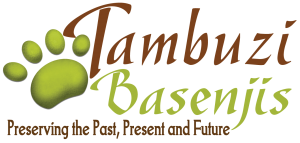When I set about looking to purchase my first Basenji I did a massive amount of research. At that time I didn't have any inclination whatsoever to breed or get involved in dog showing. However, my aspiration not to breed did not mean that I didn't research breeders. I also researched the temperament and health issues. I wanted my first Basenji from lines with good temperaments. And lines that were proven, by testing results, to be be as healthy as possible. Since then I have changed direction and started to show and breed. Hence, I compiled the following Basenji Health Management Program.
My aspiration is to provide my puppy buyers what I expected; puppies that have sound temperaments and who are from health tested stock. Puppies who are given the best possible start in life. You will not find any smoke and mirrors at this kennel. Transparency and an honest, open approach is my methodology. Talking about health issues and not hiding them and adopting a Basenji health management program is the only way breeders can combine to eradicate health issues.
Basenji Health Management
The following Basenji health management program has been compiled with consultation with vets and specialists.
Through careful selection of breeding pairings based on results from DNA tests, Fanconi Syndrome and Pyruvate Kinase Deficiency (the cause of inherited Haemolytic Anaemia in Basenjis) are both eliminated from Tambuzi kennel. All breeding stock is normal or normal by parentage history for these health issues.
Eye Health
- All puppies are screened at 6-8 weeks old by an Australian Canine Eye Scheme (ACES) approved canine eye specialist
- Breeding stock re-screened under the ACES between 3-6 years old
- Breeding stock re-screened under the ACES after the dog has reached a least 9 years old
- Breeding stock must be DNA tested for PRA-BJ1 before breeding or must be Normal by Parentage History for the disease
Dogs with the following results may be bred
- Normal eyes
- Minor iris to iris or minor floating PPM (of no clinical significance)
- Normal for late on-set PRA
- Carriers or affecteds of late on-set PRA may only be bred to a Basenji that is Normal.
Dogs with the following eye results may not be bred
- Iris to lens or iris to cornea PPM
- Coloboma of any degree
- The following combinations of PRA-BJ1 – carrier x carrier, carrier x affected and affected x affected.
- PRA – affected on physical examination
- Affected with Corneal Dystrophy - Endothelial
Fanconi Syndrome
- Mandatory that all breeding stock is tested (with the direct DNA test) before breeding or is normal by parentage history.
- Dogs tested with the linkage marker ‘probable’ test must be re-tested with the direct test before breeding. This is because the linkage marker test results may be inaccurate.
Result Analysis
The following result combinations may be bred
- Normal to normal
- Normal to carrier
None of the above combinations will produce affected puppies
The following result combinations may not be bred
Dogs with the following fanconi results may be bred
- Normal to normal
- Normal to carrier
Quality carriers should be maintained in the gene pool and used for breeding. Eliminating carrier stock would have a negative impact on genetic diversity.
Fanconi is eliminated from Tambuzi Kennels.
Dogs with the following fanconi results may not be bred
- Carrier to carrier
- Carrier to affected
- Affected to affected
All of the above combinations have the potential to produce puppies that are affected by this disease.
Hip Displasia
Dogs with the following hip results may be bred
- AVA: Dogs with a score (left +right combined )lower than 10 may be used for breeding.
- AVA: Two dogs with a combined score of 12 and less maybe used. However, no one dog’s score can be higher than 9. Where possible an individual with a score greater than 8 must be mated to an individual with a score less than 5.
- PennHIP: It is recommended that only dogs that have a laxity in the tightest half for the breed will be bed. However, due to the lack of testing of Basenjis using this method quality dogs in the looser half of the breed may be bred to dogs in the tighter half.
Dogs with the following hip results may not be bred
Any dog whose score in combination is outside the ranges opposite may not be used for breeding.
Pyruvate Kinase Deficiency (Haemolytic Anaemia)
Tambuzi Basenji Health Management Program: Breeding stock must be DNA tested or normal by parentage history before breeding.
Dogs with the following PKD results may be bred
- Normal to normal
- Normal to carrier
None of the above combinations will produce affected puppies
Dogs with the following PKD results may not be bred
- Carrier to carrier
- Carrier to affected
- Affected to affected

